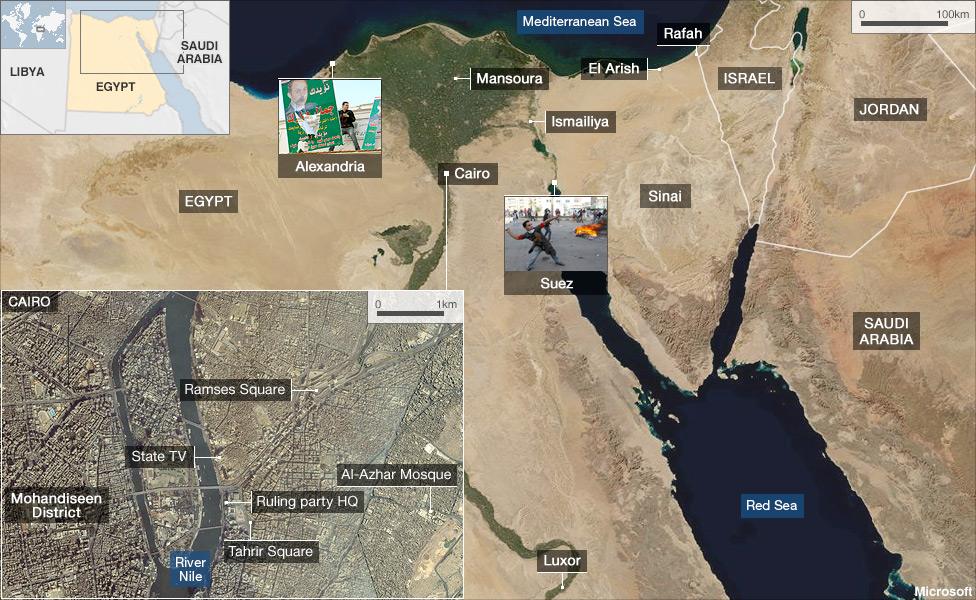Egypt protests: Mubarak names Omar Suleiman as VP
- Published
Anger on the streets but President Mubarak remains in power
Egypt's President Hosni Mubarak has named intelligence chief Omar Suleiman as his first ever vice-president as he struggles to regain control of the country.
Aviation minister Ahmed Shafiq has also been appointed as prime minister.
Tens of thousands of protesters remain on the streets in Egypt, defying a curfew and army warnings.
There have been clashes in Cairo, Alexandria and Ismailiya, while the death toll has risen to 45 at least.
In Cairo, police have fired rubber bullets and tear gas in clashes with protesters at the interior ministry, but the army has yet to step in. Injuries have been reported.
Cairo, Alexandria and Suez are under an extended curfew from 1600 to 0800 (1400-0600 GMT).
Friendly atmosphere
Cairo's central Tahrir (Liberation) Square remains filled with protesters. Troops and armoured vehicles have been deployed but have not yet taken any action.
A BBC Arabic correspondent at the scene reports a friendly atmosphere between the army and the demonstrators.
But at least 45 people have died in clashes across Egypt since Friday, according to health officials.
The latest figures bring the death toll in the week's unrest to at least 52, with both protesters and police officers among the dead. About 2,000 people have been injured.
"Live bullets have been fired at protesters, aimed at their heads," Dr Yaser Sayyed at the Sayyed Galal Hospital in Cairo told BBC Arabic.
"We have seen more than 20 cases of headshots with the bullet wounds on the front of the head and exit wounds on the other side, skulls fractured... in addition to chest wounds."
The army has advised people to obey the curfew and avoid gathering in groups.
Looters are on a rampage in a number of upper-class neighbourhoods in Cairo, while in Alexandria there are reports of widespread looting of supermarket chains.
Some residents have formed committees to protect their homes and buildings.
'Reluctant to fire'
Hundreds of foreign tourists and Egyptian nationals are at Cairo's main airport seeking flights out of the country.
Britain, the US and France are all advising against non-essential travel to Egypt.
In Abu Za'abal prison in Cairo, a political prisoner has told the BBC that 120 inmates have taken control of one sector of the jail.
Speaking by mobile phone, Mohamed Mahmud Sami - who has been in prison for 17 years - said: "Security forces are trying to storm in, but we can see that the soldiers are reluctant to fire at us, as if they want to side with the rebelling people of Egypt."
Cairo stock exchange will be closed on Sunday - a full trading day in the Middle East - because of the turmoil in the city.
After a day of violent protests on Friday, President Mubarak appeared on state TV to announce he was sacking his government. The cabinet has now formally resigned.
Mobile phone services have been restored in Cairo, but the internet remains down.
In Suez, soldiers are on the streets after the city's police fled following Friday's violence in which the main police station was burned down.
And a BBC Arabic producer reports that prison inmates have rioted in the city of Manufiya, north-west of Cairo.
US President Barack Obama spoke to Mr Mubarak on Friday and urged him to uphold promises of reform. The US will review its aid of $.15bn (£1.1bn) to Egypt based on events in the coming days.
The unrest in Egypt follows an uprising in Tunisia two weeks ago which toppled President Zine al-Abidine Ben Ali after 23 years in power.
The Tunisian upheaval began with anger over rising food prices, high unemployment and anger at official corruption - problems which have also left many people in Egypt feeling frustrated and resentful of their leadership.
